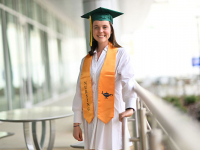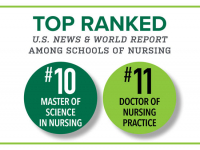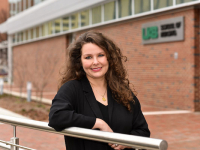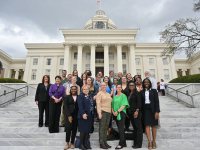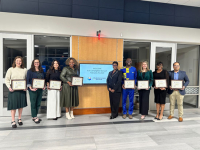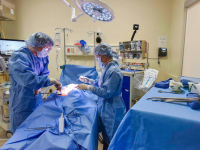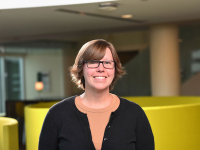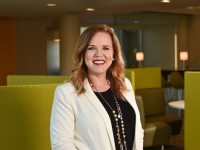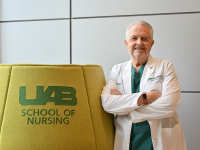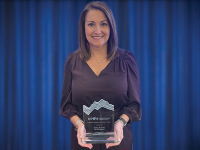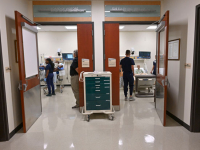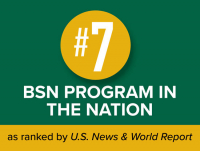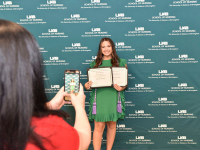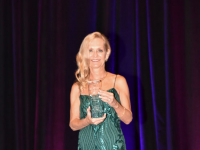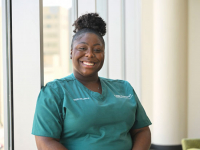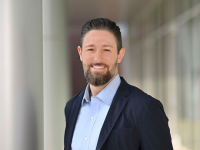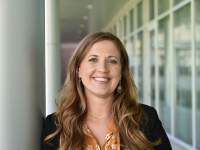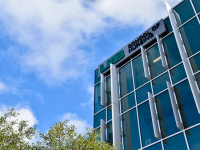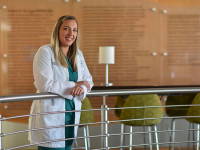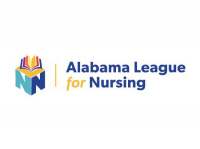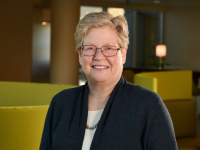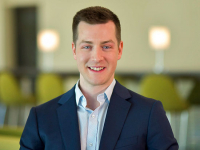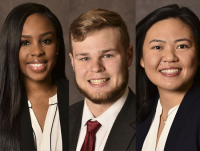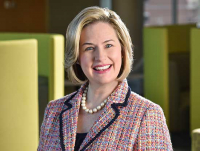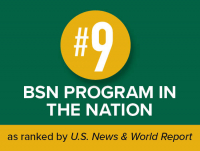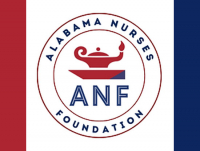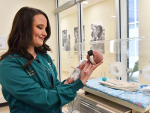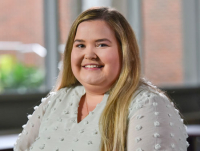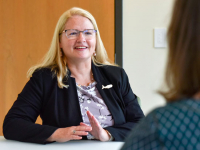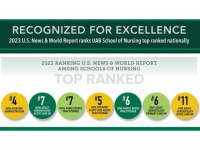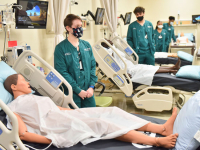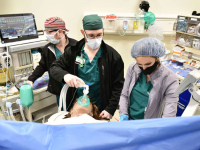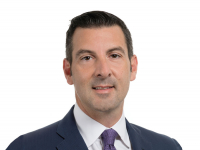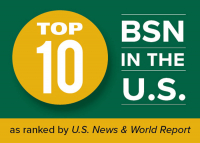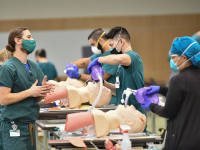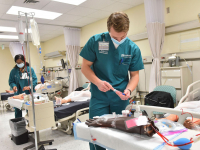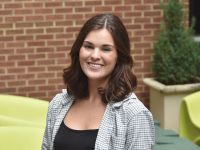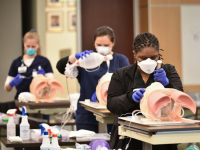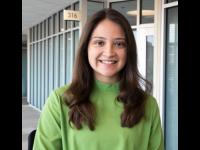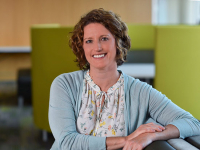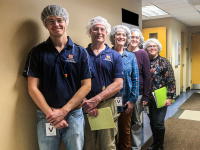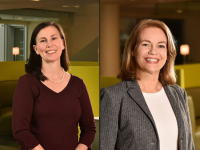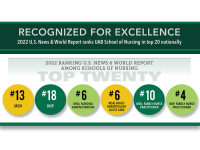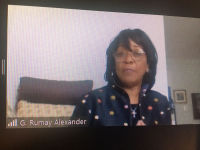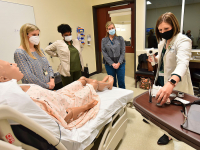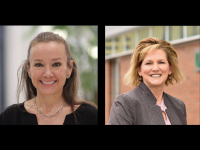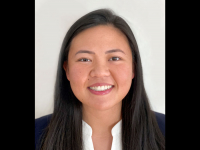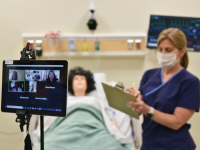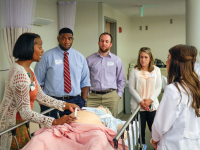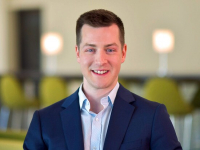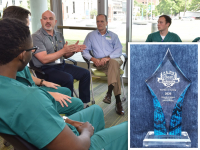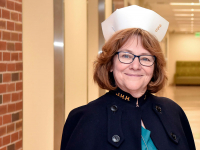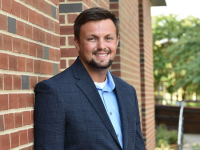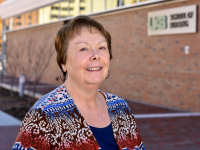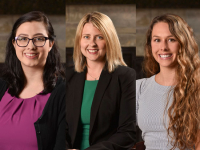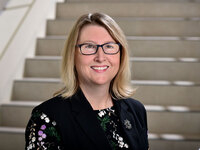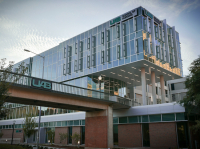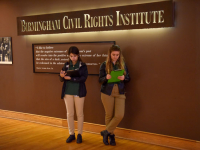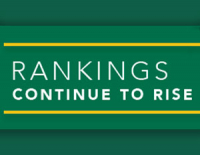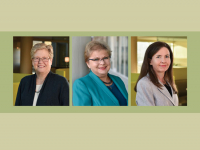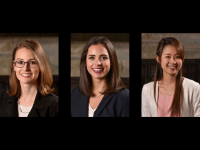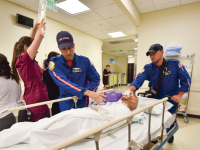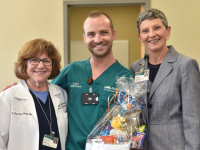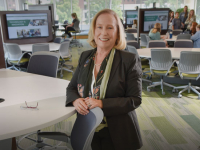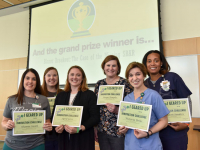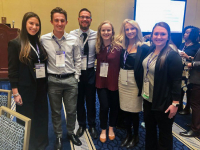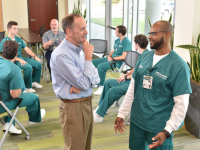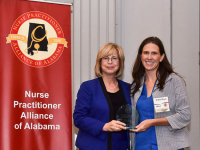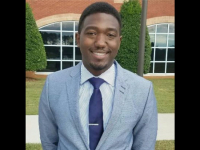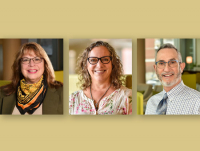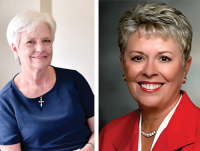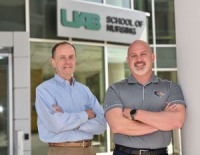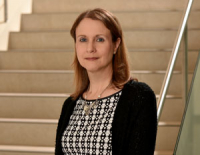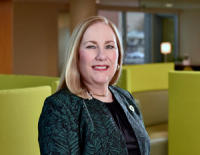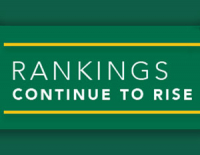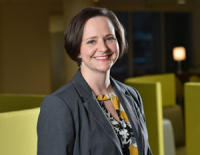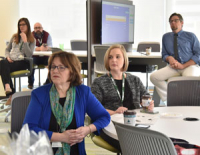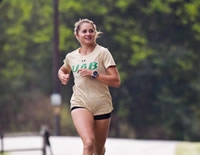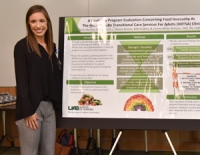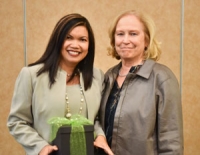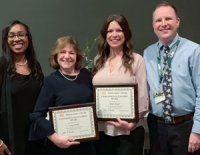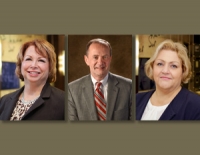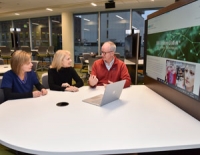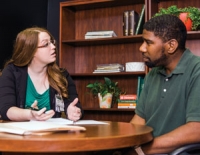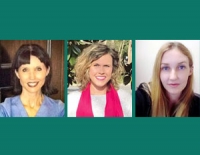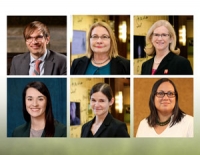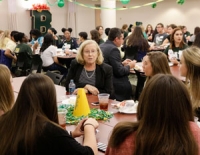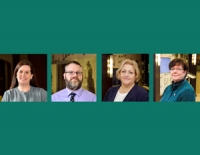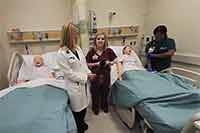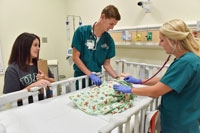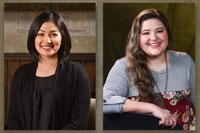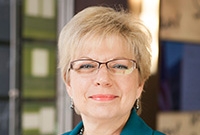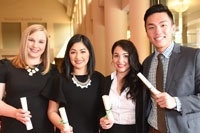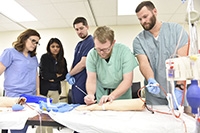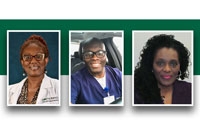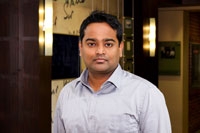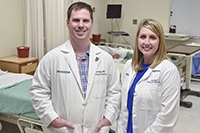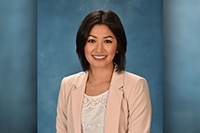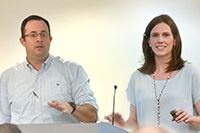Learn more about some of these current and future nurse leaders.
Bryan Combs, MSN, CRNP, FNP-BC, CNL, ATC
Bryan Combs could have seen himself being a certified athletic trainer for his entire professional career.
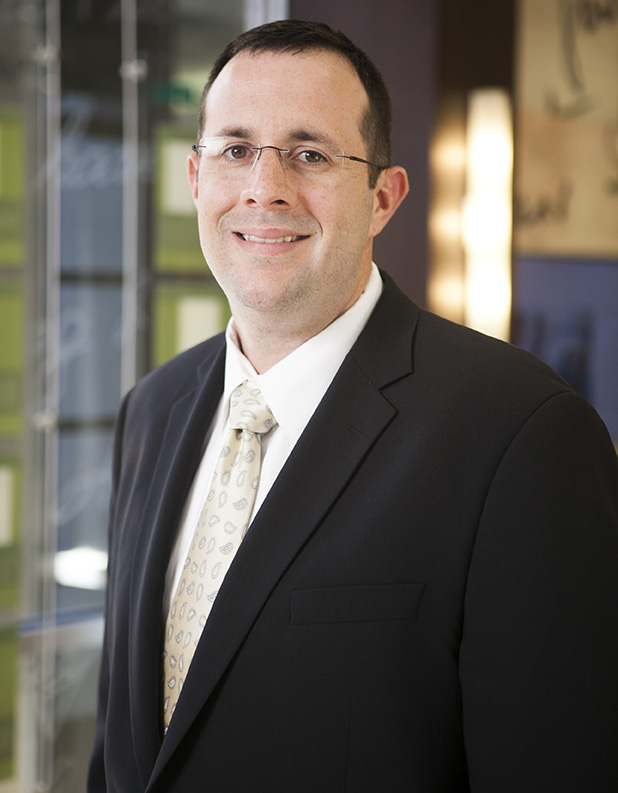 With him as with many seasoned professionals, however, the journey took a few twists and turns, and Combs found himself at a career crossroads, contemplating whether he should take another route.
With him as with many seasoned professionals, however, the journey took a few twists and turns, and Combs found himself at a career crossroads, contemplating whether he should take another route.Then from Doreen Harper, PhD, RN, FAAN, Dean of the UAB School of Nursing, Combs learned about a newly implemented program called the Accelerated Master’s in Nursing Pathway (AMNP), which seemed like a good fit for him.
“The new cohort was just being established and applications were just being accepted,” Combs said. “I decided to change routes.”
That decision led to Combs becoming a member of the School’s first AMNP cohort in May 2008, a life-changing choice he calls “the turning point in the road” for him.
“The AMNP was the best option for me because I already had a bachelor’s and master’s (in athletic training), and I didn’t want to go back to school for another two or three years to get a bachelor’s degree in nursing,” Combs said. “This program allowed me to be at the bedside caring for patients within one year as I continued to work on my master’s in nursing in the Family Nurse Practitioner specialty.”
Combs earned his first master’s in nursing in the clinical nurse leader specialty from the School in December 2010 and his second master’s as a family nurse practitioner in December 2012. He also joined the School as a full-time faculty member in September 2013 teaching in the Family Nurse Practitioner Program and is now pursuing his PhD.
Combs sees the AMNP as a cutting-edge way for the School to address the changes that are coming in the health care profession, particularly in the field of nursing.
“As the health care profession changes we will need master’s prepared nurses and others that are ready to go into the workforce,” Combs said. “Whether it’s the number of people who will be retiring in the next five to 10 years or changes in health care that are going to require more nursing leaders and advanced practice nurses in rural communities, we need to be able to plan for that.
“With the AMNP, you have a way of accelerating the process but still getting a quality outcome. You’re not rushing it. This is an out-of-the-box way of thinking of the future by taking professionals in all kinds of fields who have realized they want to work in the medical arena and bringing them into nursing.”
It is a very solid foundation on which to build the future of nursing, Combs believes.
“That’s one of the greatest things about the AMNP program,” he said. “You are taking people with different backgrounds who can make incredible contributions and be incredible assets to the nursing profession, and you’re giving them that opportunity.”
Rachel Wells, MSN, RN, CNL
Rachel Wells, a 2010 graduate of UABSON’s first AMNP class, currently works as a research nurse/nurse coach in the ENABLE CHF PC study under the guidance of Dr. Marie Bakitas. Prior to her current position and enrollment in the PhD program, she worked as a registered nurse in Heart and Lung Transplant, Cardiac ICU, outpatient cardiology, and psychiatric settings throughout the state of Alabama.
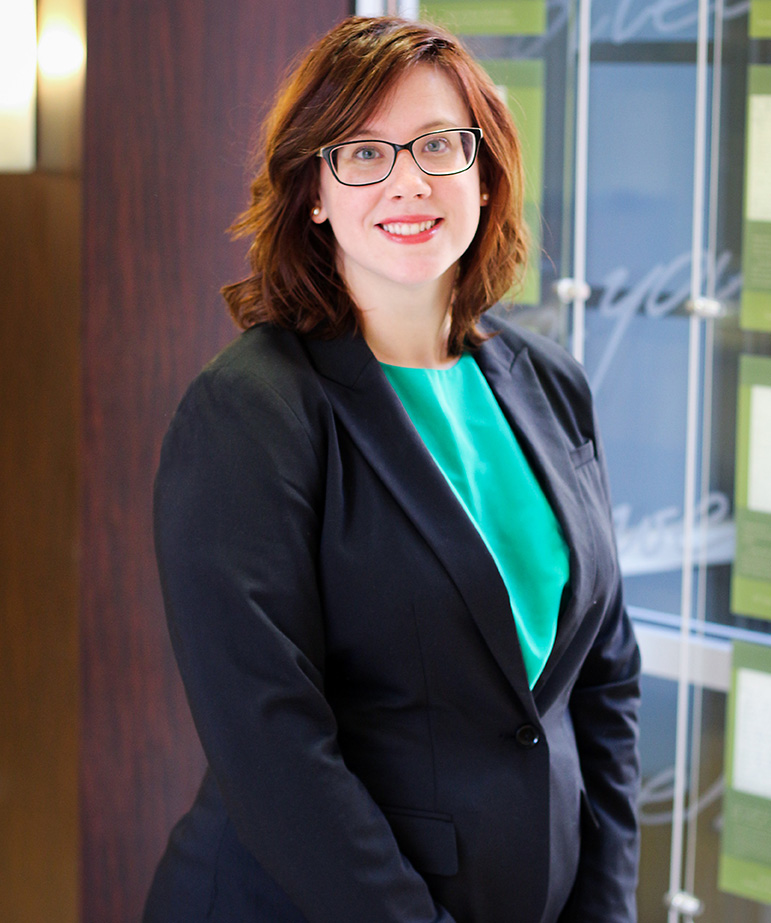 In addition to clinical work, she has been involved with nursing education as an adjunct clinical instructor. She counts her work with the ENABLE CHF PC study as a significant motivating factor in pursuing PhD studies. Rachel plans to continue to explore research design specifically within heart failure and ventricular assist devices, palliative care, and patient/ caregiver education. Specifically, she is focused on utilization of palliative care services in rural heart failure patients.
In addition to clinical work, she has been involved with nursing education as an adjunct clinical instructor. She counts her work with the ENABLE CHF PC study as a significant motivating factor in pursuing PhD studies. Rachel plans to continue to explore research design specifically within heart failure and ventricular assist devices, palliative care, and patient/ caregiver education. Specifically, she is focused on utilization of palliative care services in rural heart failure patients.Wells credits the rigorous pace of the AMNP program with preparing her for the PhD program.
“The AMNP program set the stage for being involved with a full immersion program similar to the PhD program,” she said. “Although I was primed for research interest due to my undergraduate experience in microbiology, the AMNP program continued to engage my interest in research and its utilization to transform the bedside experience.”
In her doctoral program, Wells has received funding through the prestigious Robert Wood Johnson Foundation (RWJF) Future of Nursing Scholars program to further her studies.
“The AMNP program has provided me a really solid foundation on which to build my career. My hope is to discover and translate novel and economically effective ways to deliver palliative care to communities that so desperately need it.”
Xiaoyuan Zhu-Mauldin, PhD
Dr. Xiaoyuan Zhu-Mauldin came to UAB from the remote countryside of Southern China more than a decade ago.
Although she is now a student in Phase II of the UAB School of Nursing’s AMNP program, Zhu-Mauldin initially immigrated here in search of another degree—a PhD in Cellular Biology, which she earned in 2013.
“My dream since childhood was to become a scientist,” she said. “When my elder brother was only several months old, he suffered a severe brain trauma which left him with intellectual and developmental disabilities.”
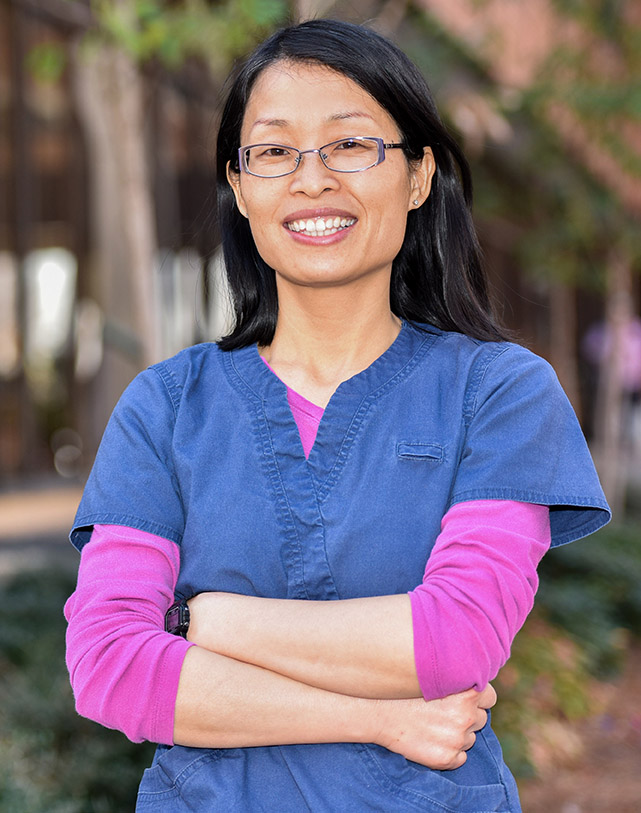 “He loves us, and I can feel it,” Zhu-Mauldin added. “Each time when he turns his head, looks at me sweetly and calls me ‘Sis,’ I strongly feel my responsibility to help heal my brother. I believed a deep study in science would prepare me to achieve this.”
“He loves us, and I can feel it,” Zhu-Mauldin added. “Each time when he turns his head, looks at me sweetly and calls me ‘Sis,’ I strongly feel my responsibility to help heal my brother. I believed a deep study in science would prepare me to achieve this.”After she earned her PhD, Zhu-Mauldin was in a situation where she felt she had to choose between her family and her career.
“In my city, there was an extremely limited number of biological research opportunities,” she said. “Also, at that time, my mom in China was diagnosed with lung cancer.
“Luckily, it was a misdiagnosis. This episode opened my mind to learn about nursing—because as a nurse, I can not only help other people, but also my family.”
Still motivated by her passion for science, Zhu-Mauldin decided to become a nurse practitioner.
“Most of the people in the Chinese countryside where I grew up are strong adherents of traditional Chinese medicine, especially herbal medicine and dietary therapy, even when these are not supported by science,” she said. “As a nurse practitioner, I knew I could use my professional knowledge to better help my family in China to make the right decisions about their medical care when needed.”
Choosing the UAB School of Nursing’s AMNP program was an easy decision for Zhu-Mauldin.
“As a student who has spent over a decade at UAB, I am familiar with its every corner,” she said. “The UAB School of Nursing has a top-ranked academic environment and teaching system. I like the people here, as well as the rich academic, health, and cultural resources,”
Zhu-Mauldin said. “Its AMNP program, which is specific for students who already have a degree, was the first and best starting point for me.”
After completing the pre-licensure phase of the AMNP program and becoming a Registered Nurse, Zhu-Mauldin worked in long-term care before joining the staff of UAB Hospital as a full-time RN on one of its general medicine floors while pursuing her family nurse practitioner master’s degree requirements. She expects to graduate later this year.
Jeremy Jordan, MSN, CRNP, CPNP-AC, CCRN
Jeremy Jordan cares for Alabama’s most critically-ill and injured children in his nurse practitioner role at Children’s of Alabama, the third largest pediatric medical facility in the U.S.
He works in the Pediatric Intensive Care Unit (PICU), which sees patients being treated for the worst cases of traumatic brain injuries, septic shock, complications from cancer, respiratory failure, injuries from car accidents and more.
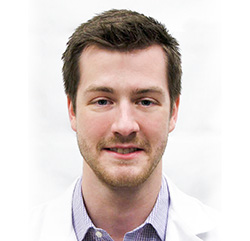 “My clinical responsibilities include developing, implementing, and re-evaluating plans of care for our patients, responding to codes throughout the hospital, serving as an intensive care consultant for other health care teams, assisting with educating resident physicians and nursing staff, as well as serving as a patient and family advocate and educator,” Jordan said.
“My clinical responsibilities include developing, implementing, and re-evaluating plans of care for our patients, responding to codes throughout the hospital, serving as an intensive care consultant for other health care teams, assisting with educating resident physicians and nursing staff, as well as serving as a patient and family advocate and educator,” Jordan said.Jordan is a two-time alumnus of UAB. He earned his Bachelor of Science in Healthcare Management in 2011 and his Master of Science in Nursing in 2015 after completing the AMNP.
Jordan serves on several committees and councils at Children’s of Alabama, including the Quality Improvement Council for the PICU.
“A project we are particularly proud of is a protocol for the care of post-operative spinal fusion patients,” he said. “The new protocol has decreased their length of stay from 5 to 7 days down to only 3 days, which reduces risk of complications and cost.”
Now serving as co-investigator on several research projects in the PICU in conjunction with physicians and the UAB School of Medicine, Jordan credits his ability to juggle his busy schedule to the AMNP program.
“The program’s fast pace and demanding course load provided me with the clinical skills I needed to succeed in the PICU,” he said. “I learned to not only think critically, but to shift my critical thinking as the patients’ condition changes rapidly—which is often minute-to-minute or second-to-second.
“To succeed in the AMNP program, you have to be—or become—self-motivated and willing to invest in your own education. This has served me well, especially in critical care, as treatment modalities and therapies are being improved and developed frequently,” Jordan said. “Staying up-to-date on the most current knowledge is only accomplished by being self-motivated.”
Having heard that the Bachelor of Science in Nursing degree is regarded nationwide as the most challenging undergraduate degree, he describes the pre-licensure phase of the AMNP program as “condensing that two and a half year program down to one ironman triathlon of a year.”
“I learned the power of teamwork with my fellow classmates and that has translated seamlessly into practice,” Jordan said. “The AMNP program is truly special because of the faculty and staff’s investment in our successes, and that is why I would do it again in a heartbeat.”
Thomas Sargent, MSN, CRNP
Thomas Sargent realized his passion for mental health long before deciding to become a psychiatric nurse practitioner.
During his last semester as a biology student at the University of Alabama in Huntsville, he worked at a rehabilitation facility for people with chemical dependencies and drug addictions, specifically adolescents ranging from age 12 to 18.
“It was my favorite job ever,” he said.
After completing his biology degree, he moved to Birmingham and began working at Alabama Clinical Schools, a facility for young men under age 18 struggling with behavioral disorders.
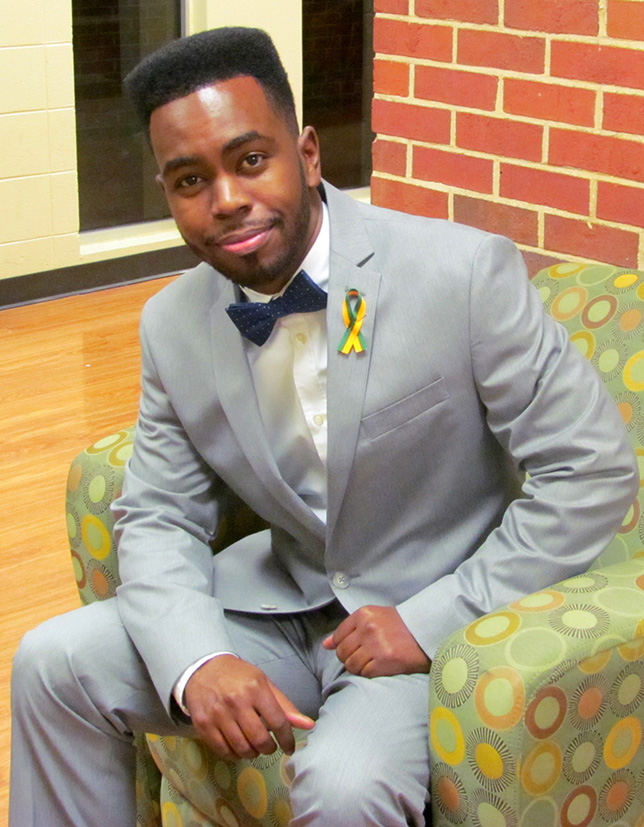 “Working with young men who have a history of sexually aggressive behavior was hard,” Sargent said. “The job was very stressful, but it opened my eyes to how much our population needs mental health providers. That’s what made my decision to go into nursing clear.”
“Working with young men who have a history of sexually aggressive behavior was hard,” Sargent said. “The job was very stressful, but it opened my eyes to how much our population needs mental health providers. That’s what made my decision to go into nursing clear.” Sargent began researching ways to become a psychiatric nurse practitioner. He applied to several traditional Bachelor of Science in Nursing (BSN) programs, but was most attracted to UAB School of Nursing’s AMNP program because it would jumpstart his nursing career, enabling him to practice as a registered nurse after one year while pursuing his psychiatric mental health master’s degree requirements.
Upon completion of the program in 2016, Sargent began working for Integrated Behavioral Health in Huntsville, Alabama, where he serves in both outpatient and hospital settings.
“I immediately inherited 250 patients who were without a mental health care provider,” he said. “Even now, my schedule is full every day with new patients who have been waiting for months to be seen.”
Sargent is helping to fill a critical void in mental health care providers.
“Alabama’s shortage of mental health care providers is staggering. The adolescent and adult patients I see in the hospital have often been struggling to find a provider for a long time, and they have reached their last resort of attempting suicide,” he said.
Between his biology degree and his advanced practice nursing education, Sargent feels like he is a step ahead of other colleagues in similar phases of their careers.

